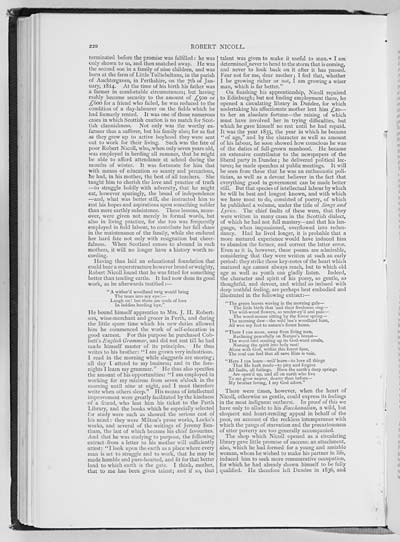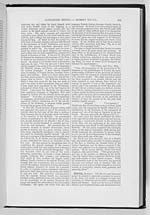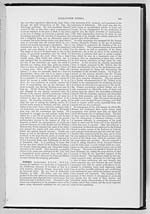22O
terminated before the promise was fulfilled: he was
only shown to us, and then snatched away. He was
the second son in a family of nine children, and was
born at the farm of Little Tulliebeltane, in the parish
of Auchtergaven, in Perthshire, on the 7th of Jan-
uary, 1814. At the time of his birth his father was
a farmer in comfortable circumstances; but having
rashly become security to the amount of �"500 or
�600 for a friend who failed, he was reduced to the
condition of a day-labourer on the fields which he
had formerly rented. It was one of those numerous
cases in which Scottish caution is no match for Scot-
tish clannishness. Not only was the worthy ex-
farmer thus a sufferer, but his family also; for as fast
as they grew up to active boyhood they were sent
out to work for their living. Such was the fate of
poor Robert Nicoll, who, when only seven years old,
was employed in herding all summer, that he might
be able to afford attendance at school during the
months of winter. It was fortunate for him that
with means of education so scanty and precarious,
he had, in his mother, the best of all teachers. She
taught him to cherish the love and practice of truth
�to struggle boldly with adversity, that he might
eat, however sparingly, the bread of independence
�and, what was better still, she instructed him to
rest his hopes and aspirations upon something nobler
than mere earthly subsistence. These lessons, more-
over, were given not merely in formal words, but
also in living practice, for she too was frequently
employed in field labour, to contribute her full share
in the maintenance of the family, while she endured
her hard fate not only with resignation but cheer-
fulness. When Scotland ceases to abound in such
mothers, it will no longer have a history worth re-
cording.
Having thus laid an educational foundation that
could bear a superstructure however broad orweighty,
Robert Nicoll found that he was fitted for something
better than tending cattle. It had now done its good
work, as he afterwards testified:�
"A wither'd woodland twig would bring
The tears into my eye:�
Laugh on! but there are souls of love
In laddies herding kye."
He bound himself apprentice to Mrs. J. H. Robert-
son, wine-merchant and grocer in Perth, and during
the little spare time which his new duties allowed
him he commenced the work of self-education in
good earnest. For this purpose he purchased Cob-
bett's English Grammar; and did not rest till he had
made himself master of its principles. He thus
writes to his brother: "I am grown very industrious.
I read in the morning while sluggards are snoring;
all day I attend to my business; and in the fore-
nights I learn my grammar." He thus also specifies
the amount of his opportunities: "I am employed in
working for my mistress from seven o'clock in the
morning until nine at night, and I must therefore
write when others sleep." His means of intellectual
improvement were greatly facilitated by the kindness
of a friend, who lent him his ticket to the Perth
Library, and the books which he especially selected
for study were such as showed the serious cast of
his mind: they were Milton's prose works, Locke's
works, and several of the writings of Jeremy Ben-
tham, the last of which became his chief favourites.
And that he was studying to purpose, the following
extract from a letter to his mother will sufficiently
attest: "I look upon the earth as a place where every
man is set to struggle and to work, that he may be
made humble and pure-hearted, and fit for that better
land to which earth is the gate. I think, mother,
that to me has been given talent; and if so, that
talent was given to make it useful to man. I am
determined never to bend to the storm that is coming,
and never to look back on it after it has passed.
Fear not for me, dear mother I feel that, whether
I be growing richer or not, I am growing a wiser
man, which is far better."
On finishing his apprenticeship, Nicoll repaired
to Edinburgh; but not finding employment there, he
opened a circulating library in Dundee, for which
undertaking his affectionate mother lent him �20�
to her an absolute fortune�the raising of which
must have involved her in trying difficulties, but
which he gave himself no rest until he had repaid.
It was the year 1835, the year in which he became
"of age," and by the character as well as amount
of his labour, he soon showed how conscious he was
of the duties of full-grown manhood. He became
an extensive contributor to the newspapers of the
liberal party in Dundee; he delivered political lec-
tures; he made speeches at public meetings. It will
be seen from these that he was an enthusiastic poli-
tician, as well as a devout believer in the fact that
everything good in government can be made better
still. But that species of intellectual labour by which
he will be best and longest known, and with which
we have most to do, consisted of poetry, of which
he published a volume, under the title of Songs and
Lyrics. The chief faults of these were, that they
were written in many cases in the Scottish dialect,
of which he had not full mastery�and that his lan-
guage, when impassioned, overflowed into redun-
dancy. Had he lived longer, it is probable that a
more matured experience would have induced him
to abandon the former, and correct the latter error.
Even as it is, however, these poems are admirable,
considering that they were written at such an early
period: they strike those key-notes of the heart which
matured age cannot always reach, but to which old
age as well as youth can gladly listen. Indeed,
the character and spirit of his poesy, so gentle, so
thoughtful, and devout, and withal so imbued with
deep truthful feeling, are perhaps best embodied and
illustrated in the following extract:�
"The green leaves waving in the morning gale�
The little birds that 'mid their freshness sing�
The wild-wood flowers, so tender-ey'd and pale�
The wood-mouse sitting by the forest spnng�
The morning dew�the wild bee's woodland hum,
All woo my feet to nature's forest home.
" There I can muse, away from living men,
Reclining peacefully on Nature's breast�
The wood-bird sending up its God-ward strain,
Nursing the spirit into holy rest!
Alone with God, within this forest fane,
The soul can feel that all save Him is vain.
"Here I can learn�will learn�to love all things
That He hath made�to pity and forgive
All faults, all failings. Here the earth's deep springs
Are open'd up, and all on earth who live
To me grow nearer, dearer than before�
My brother loving, I my God adore."
There were times, however, when the heart of
Nicoll, otherwise so gentle, could express its feelings
in the most indignant outburst. In proof of this we
have only to allude to his Bacchanalian, a wild, but
eloquent and heart-rending appeal in behalf of the
poor, on account of the reckless intemperance with
which the pangs of starvation and the precariousness
of utter poverty are too generally accompanied.
The shop which Nicoll opened as a circulating
library gave little promise of success: an attachment,
also, which he had formed for a young and amiable
woman, whom he wished to make his partner in life,
induced him to seek more remunerative occupation,
for which he had already shown himself to be fully
qualified. He therefore left Dundee in 1836, and

![]() Universal Viewer |
Universal Viewer | ![]() Mirador |
Large image | Transcription
Mirador |
Large image | Transcription
![]()

